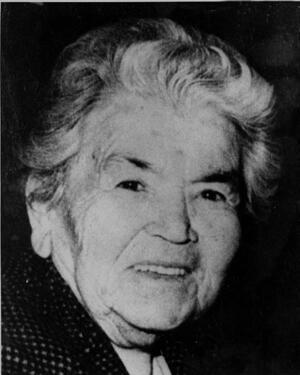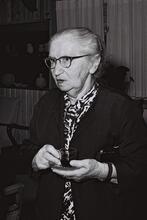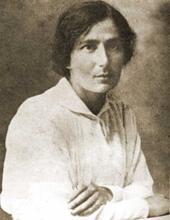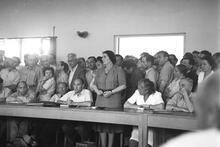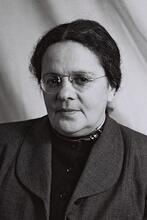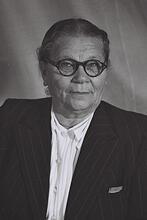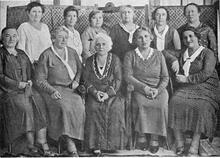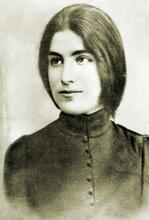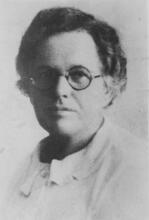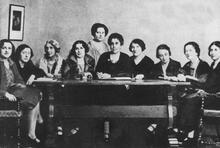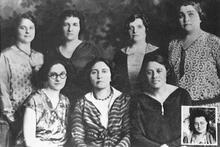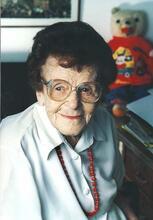Hayuta Busel
Hayuta Busel
Courtesy of Kibbutz Deganyah Aleph Archives/Wikimedia Commons.
As a widowed immigrant and young mother, Hayuta Busel fought to expand options for women in Palestine. Hayuta Gavsu followed her friend Joseph Busel to Palestine at age eighteen to join the kibbutz movement. The couple began an unconventional and equal relationship, where Joseph took care of their daughter while Hayuta worked as a kindergarten teacher in Deganyah. After his death, Hayuta raised their daughter while working to establish a childcare system for kibbutzim. She organized in the women’s labor movement, arguing for equality and striving to give women options beyond childcare and housekeeping. She travelled regularly to Poland to organize Zionist youth. By the 1950s, frustrated by the kibbutz movement’s continuing problems, she began writing about her own experiences and her dreams for true equality.
One of the outstanding members of the Second Lit. "ascent." A "calling up" to the Torah during its reading in the synagogue.Aliyah (1904–1914), Hayuta Busel believed profoundly in the liberation of Jews, especially women, in the Hebrew language, and in the creation of a new model of family which would facilitate women’s liberation. In this respect, she was among those who were not prepared to subjugate their feminist goal to the more general political ideology of the state-in-the-making.
Family and Partnership
Though Busel was born in 1890 into the observant Gavsu family of A member of the hasidic movement, founded in the first half of the 18th century by Israel ben Eliezer Ba'al Shem Tov.hasidim of the Stolin rebbe, she preferred to remember her father as someone who rebelled against his teacher by posing rationalist questions. Of the family’s eleven children, five died, leaving her the only girl among the survivors.
In an act that was considered outrageous in her hometown, where anti-Zionist An ultra-Orthodox Jewharedim were the majority, Busel decided at the age of eighteen to emigrate to The Land of IsraelErez Israel with her friend Joseph Busel (1891–1919), who was younger than herself and to whom she was not married. Already quite fluent in Hebrew, she kept a diary from the day of her arrival in the country, where she worked as a kindergarten teacher in Jaffa, Haderah, and Rishon le-Zion. Joseph, who came from her home town, joined a commune that had already existed there. He sought to establish a group that would settle on the land, would be collectively responsible for production,n and would strictly observe the principle of equality. This was the first example of a combination of the concept of commune with the dream of settling the land. As for Hayuta, she was not sure that Degania would fulfill her desires, nor was she certain that the attempt to establish a commune would be successful. She and Joseph began an intense and lengthy discussion on issues related to love and marriage: how to maintain a love relationship without betraying the love of humanity, ideology of women’s liberation, establishing the “new family,” Hebrew language, and fulfillment of Zionist ideology.
In 1913 Hayuta arrived at Degania, intending to become a member of the group and to participate in determining its nature and purposes. She soon discovered that Degania was far from being a fulfillment of her dreams. Deciding that she must return there as a fully trained agricultural laborer, she left for studies at the women’s farm established by Hannah Maisel at Kinneret.
In 1914 Joseph Busel’s mother arrived in Palestine and settled in the An ultra-Orthodox Jewharedi community in Tiberias. Two years after the outbreak of World War I she invited the couple for the A seven-day festival to commemorate the Exodus from Egypt (eight days outside Israel) beginning on the 15th day of the Hebrew month of Nissan. Also called the "Festival of Mazzot"; the "Festival of Spring"; Pesah.Passover Lit. "order." The regimen of rituals, songs and textual readings performed in a specific order on the first two nights (in Israel, on the first night) of Passover.seder, which turned out to be a way of trapping them into marriage. Even though Hayuta and Joseph were not living together at the time, she wanted to formalize their long-standing relationship. Hayuta erected a booth on the shore of Lake Kinneret, which became their “love booth.”
Women’s Organizing
Busel was extremely active among the women of the Second Lit. "ascent." A "calling up" to the Torah during its reading in the synagogue.Aliyah. The famine that broke out in the country and the breakdown of the economy led the women laborers to organize into small groups, which planted and tended vegetable gardens and cared for the famished workers. This was part of a major project to establish local houses for the laborers and to organize public services that could together deal with the dreadful shortages. Both the Jewish community and the Zionist movement were involved in this project.
When the women’s farm at Kinneret was closed down and its director Hannah Maisel began traveling abroad to raise funds, the school reorganized as a women’s A voluntary collective community, mainly agricultural, in which there is no private wealth and which is responsible for all the needs of its members and their families.kibbutz, which Busel joined, becoming one of its leading members. “The
A voluntary collective community, mainly agricultural, in which there is no private wealth and which is responsible for all the needs of its members and their families.kevuzah of the Twenty” was the name given to this group of nineteen women and one man.
In 1918 Busel was about to establish a new women’s group in Metullah, a Lit. "village." The dominant pioneer settlement type of the Jews in Palestine between 1882moshavah that had been partially deserted and where there was an urgent need to provide a livelihood for both the men and women laborers. Since Joseph’s relationship with Degania had become rather tense and he was in need of some rest from his intense public activities, Hayuta suggested that they take a vacation and join the new group in Metullah. Though Joseph at first agreed, he changed his mind when he learned that if he left Degania others would follow suit. Hayuta, now pregnant, went to Metullah alone, but when Joseph fell ill she returned to Degania, where she became a kindergarten teacher. After the birth of their daughter, Hadassah, which was difficult due to lack of adequate medical assistance, the couple began to live in a manner far from that common at the time, with Joseph taking full responsibility for child care. But a few months later Joseph drowned as he was returning from a meeting in Tiberias, leaving Busel alone to care for their child after eleven years of partnership and a joint search for a life of companionship.
In the firm belief that Deganyah and the kibbutz as a whole would be the place where the “new family” would develop and where women would be freed from their burden of slavery, Busel became extremely active in education at Degania Aleph and helped establish both its network of child care and the joint elementary school of the Jordan Valley A voluntary collective community, mainly agricultural, in which there is no private wealth and which is responsible for all the needs of its members and their families.kibbutzim.
Extremely active in organizing the country’s women’s movement, she was fully aware of the gap between the struggle for women’s rights in the Jewish-Zionist society that had arisen in Erez Israel and the actual status of the women laborers and their movement who sought to liberate women workers and have them recognized as full and equal partners in the Zionist settlement being established in the country.
Public Political Work
Busel believed in making do with only a little, in order to free the resources required for coping with social issues and for activity in the areas of both work and culture. She stressed the need to free oneself from the worship of consumerism, especially in times of self-fulfillment, with its concomitant need for constant self-improvement. Busel was a regular participant in the meetings of the country’s workers from the first one, held at Kinneret in 1911.
In 1924 she was elected to the first Elected Assembly and was sent as a Jewish National Fund emissary to Poland, where she came into contact with pioneering youth. Returning to Degania in 1929, at the time of the great crisis that followed the riots of that year, she set out to help the unemployed women workers in Tiberias. After every one of her trips abroad she returned to Degania and served in various public capacities. She was again sent to Poland, this time to work with the Gordonia movement.
In 1937 Hayuta Busel replaced her friend Ada Maimon as director of the women’s farm at Ayanot. Her relationship with Maimon was important to both of them; together they represented the more radical sector of the women’s movement, who were not prepared to abandon the independence of women’s struggle in favor of the country’s political struggles, nor to give in to the Erez Israel Workers’ Party, which sought to harness all the political organizations into one united political center capable of dealing with all the various nationalistic tasks. For their part, Busel and her colleagues wished to maintain the independence of the women’s movement. Although their sector was highly esteemed, the leadership attempted to limit their authority. Busel decided to concentrate on her kibbutz and the kibbutz movement, hoping to establish a network of kibbutz education. She was one of the initiators of the kibbutz teachers’ seminary in Tel Aviv.
During the 1950s, Busel felt that the kibbutz and the women workers’ movement had not invested sufficient effort in achieving their goals, that commitment to new female/sing.; individual(s) who immigrates to Israel, i.e., "makes aliyah."olim was not being put into practice and that women were not being liberated. She published numerous articles in which she recounted her own story and that of her aliyah, all the while trying to retain her values and their capacity to impact on modern times. In her final years she served as bookkeeper at Degania.
Later Life
Busel’s widowhood and her lack of desire to remarry stemmed from her fear that she would never find a man able to rebuild the kind of “new family” which she and Joseph had sought to establish, one like that which they had begun to create when Hadassah was born. She could not conceive how she might preserve the memory of her beloved husband, together with whom she had planned a new way of life. Could widowhood and freedom go together?
After the War of Independence, Busel was active in finding life partners for the young widows of Degania. She realized that widowhood stressed dependence and the inability to maintain independence. Though she found means of expressing herself through work, leadership, and education, she remained obsessed with the memory of her dead husband. Over the years, her imagined dependence on him deepened. She was convinced that his colleagues had failed to understand her attempt to establish a free family that would protect her autonomy as a woman. When she tried to explain to Aharon David Gordon (1856–1922) why she could not establish a family after Joseph’s death, she defined the task of a free mother in the framework of a pioneering family: “A mother’s task does not stem from animal-like licking of her cubs, but from her being a woman and a mother to a human being.” In her journal she explicates this:
The primary condition for struggle is total freedom. We did not want to tie our hands so as to be immobile, but rather to untie the fetters with which others had tied us, so as to be more than parents and able to fight. Everything demanded our might and our strength. The journey to Erez Israel, absorption in the land, the search for different paths—all these demanded of us such enormous effort that we had to be free of another burden, such as leading a private family life. In every place and instance, we asked ourselves whether the step we wished to take might not detract from the freedom of the individual.
Hayuta Busel died on October 10, 1975, in Degania, where she is buried.

